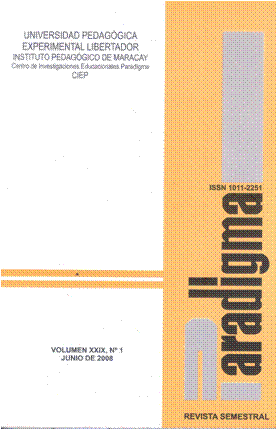CONOCIMIENTOS QUE INTERACCIONAN EN UNA CLASE DE CIENCIAS NATURALES
Resumen
El objetivo de este trabajo fue caracterizar los conocimientos que se manifiestan en una clase de ciencias naturales; se desarrolló con metodología cualitativa, privilegiando el estudio de casos como el diseño más pertinente y natural para acercarnos a la realidad del docente y su pensamiento (Sandin, 2003). Para la recolección de la información utilizamos métodos interactivos y no interactivos (Goetz y LeCompte, 1988); entre los interactivos se seleccionó la entrevista semiestructurada y como no interactivo se utilizó la observación de clase, para lo cual se siguieron las indicaciones establecidas por Quevedo (2005a). Como hallazgo destacamos la identificación de diversos tipos de conocimiento, prevaleciendo experiencial, tanto en lo didáctico (organización y planificación de la clase) como en lo disciplinar. Concluimos que el profesor es un sujeto epistémico que va construyendo desde su perspectiva el conocimiento que lleva al aula. En esta construcción participan elementos de los conocimientos científico y cotidiano, del currículo, del contexto escolar, así como sus creencias y valores.Palabras claves. Pensamiento del profesor, conocimiento profesional del profesor, conocimiento formal, conocimiento experiencial, acción docente.KNOWLEDGE TO INTERACTION IN A CLASS OF NATURAL SCIENCEAbstractThis study aimed characterize the knowledge that manifest themselves in a kind of natural sciences. In light of the foregoing, we assume this investigation is under the approach to the qualitative approach, favoring the use of case studies as the most appropriate and natural for closer to the reality of teaching and his thinking (Sandin, 2003). In order to collect the information we use interactive and non-interactive methods (Goetz and LeCompte, 1988). As interactive method selects the interview, in the form of semi-structured interview and as a non-interactive method we use observation class, which followed the directions set by Quevedo (2005a). As the main finding, we highlight the identification of various skills, whichever is the experiential knowledge, both in teaching (organization and planning of the class) and in what discipline. Concluding that the teacher is a subject that epistemic being built from their knowledge that leads to the classroom. This involved construction elements of scientific knowledge, knowledge of the everyday curriculum, the school context, their beliefs and values.Key words. Thought teacher, teacher’s professional knowledge, knowledge formal, experiential knowledge, teaching actionDescargas
La descarga de datos todavía no está disponible.
Publicado
2014-11-27
Métricas
- Visualizaciones del Artículo 68
- PDF downloads: 30
Cómo citar
Arteaga (LUZ-Venezuela), Y., & Inciarte G. (LUZ-Venezuela), A. (2014). CONOCIMIENTOS QUE INTERACCIONAN EN UNA CLASE DE CIENCIAS NATURALES. PARADIGMA, 29(1), 147-170. https://doi.org/10.37618/PARADIGMA.1011-2251.2008.p147-170.id404
Sección
Artículos























































